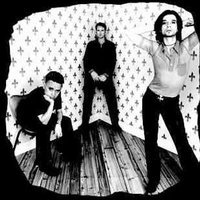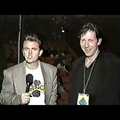"Depeche Mode: 'We were ridiculed and now we're praised'
by Rhian Jones
It’s hard to put your finger on why Depeche Mode don’t quite demand a natural spot in that well-worn, Buckingham Palace-topping pantheon of mainstream British greats. The synth-pop trio - made up of Basildon-born Dave Gahan, Andy Fletcher and Martin Gore - humbly admit that their most loyal fans are to be found “anywhere East of England”.
Yet the group’s sales numbers are astonishing: to date, Depeche have sold over 100 million records and scored 48 songs in the Official UK Singles Chart. They can also boast of 12 Top Ten albums, two of which debuted at No. 1. Early classics such as Just Can’t Get Enough, People Are People, See You and Personal Jesus secured them a place as the quintessential Eighties techno-pop band. The latter, of course, was given even greater gravitas by Johnny Cash’s classic late-life interpretation.
But the Nineties brought Britpop, and despite two further decades of album releases and solo records, fickle England seemed to have moved on from Depeche’s gloomy Bowie-inspired sounds. Could now be the time for a public reappraisal? Might Depeche finally be set to claim a deserved reputation as one of Britain’s most innovative, influential and downright popular artists?
Thirty-two years since the band’s birth, Music Week heads to Paris to find out. We chat to Gahan and Gore at the announcement of their 2013 plans - which include their 13th studio album (“probably the best record we’ve made for a long time”, says Gahan) and a 34-date worldwide stadium tour.
With a team headed up by visibly proud Daniel Miller, founder of the band's UK label Mute Records, plus manager Jonathan Kessler and legendary PR personality Barbara Charone - not to mention legions of extremely excited international press and fans - are Depeche about to become one of next year’s biggest success stories?
You’re still booking stadium tours after over three decades in the business, what’s your secret?
Martin: That's a very good question that we really don't know the exact answer to. I think somehow we've managed to capture emotion and passion in music that connects with an audience and a lot of them have stayed with us for a long time.
When it comes down to it, you’re still three lads from Essex: what is it about Depeche Mode that has found such favour across the globe?
M: There are certain places where people seem have more of an affiliation with us; generally Europe as a whole - even Holland’s starting to get on board a little bit more than it used to. But the UK is the one place where we probably do least well. In Europe and especially when you get to places like Germany and anywhere eastwards, it seems to be more than just about the music, it’s like a lifestyle for them. They follow us, they wear uniforms of black - we call them the black swarm - we seem to be really really important to them.
Dave: I think it’s also because we come from a real place emotionally. I mean there’s an image which has developed over the years and we’re quite comfortable with that as well: we’d much rather be with the misfits than be with the norm. That’s always been the case, we were ridiculed for it in the beginning and now we’re praised for it.
Do you feel like you’ve ever been fully appreciated in the UK?
D: Probably not. It’s probably the bain in our side if we’re really honest. I mean we should get fucking OBEs because we’re still going and we really are a very English band. Forget all the Britpop which was just a rip-off of everything that came before – The Stones, The Beatles and stuff. We actually took music somewhere else and I think arguably in the beginning it was just not understood.
M: We did really well in the early Eighties in the UK, but I think because we became so successful so quickly it was hard to maintain that momentum, and the English in general have the kind of mentality where they want to move on to the next thing much quicker than anybody else. There's a lot more longevity for bands in other countries because people don’t have that mentality.
As a band, you’ve had a pretty tight relationship with Daniel Miller right from the start. What is it that’s sustained your partnership?
M: We just have a lot of respect for Daniel. He understands our music very well and he’s not like, you know, a normal record company person.
What would you say a ‘normal record company person’ is, exactly?
M: Well fortunately we don’t have to deal with too many of them because we've been shielded by Daniel a lot over the years. We kind of have the umbrella of Mute over us, but you know just…
... perhaps more business thinking rather than music thinking?
M: Yes. We know from talking to our producer or engineer who would have to deal with A&R men on a regular basis. You come into the studio and they come up with the vaguest terms: “This is not how we were seeing it, we wanted more music in it.” It’s like, “What?! What?!” Whereas Daniel can come in and say: “I don't think that's going in the right direction, I could see a really nice sequencer going in there,” and he could even put an idea together for us if he wanted to. In a way, he was an idol of ours before we even got involved with him; we were big fans of the Mute label before we started putting out tracks with Daniel.
D: He cares about the art of it and the creativity of it and the fact that music can be made from anything. There’s no restriction to the type of instrumentation that you necessarily have to use - what’s important is the song and the idea behind it and that doesn’t really happen [elsewhere] now.
How does the new music sound in comparison to early Depeche Mode?
M: I think there are different phases in our music and the really early stuff to me sounds like a completely different band. We were very very ‘poppy’ and when I took over the songwriting we got a bit more, for want of a better word, serious. But I still don't see our music as being very doomy or dark. Some of the tracks are very electronic and some of them are rockier.
D: This record feels like it’s been steeped in blues influences, in the recording and in the sound of it, it’s still electronic. I think it’s probably the best record we’ve made for a long time. I’m surprised by that, I’m surprised at how well Martin and I worked together, how we shared songwriting a lot more than we had before. We recorded six of my songs, probably only a few will end up on the record but I'm fine with that. I stretched myself vocally a lot more on this record than I have before, I wanted to push the keys that I sang songs in higher, I wanted to go out of my comfort zone.
How has Martin’s songwriting style changed over the years of Depeche Mode?
M: I would like to think that it’s got better. I’m always drawn back to similar subjects: there’s always some kind of religious imagery-type topics that come up and various forms of relationships that you’re not quite sure what they’re about. I think that vagueness is one of the things that helps us communicate to people, because people write their own lives into the songs.
Here’s a question we ask almost everyone:what would you change about the music industry and why?
M: I’m not advocating violence, but I think somebody should shoot Simon Cowell! His influence in the music industry over the last God knows how many years it’s been now... it’s just like, so many people think that that's what music is. What happened to bands getting together? They are very few and far between now and the ones that do probably can’t afford to get into a studio and make a record.
D: It’s a pretty horrible business today really, I’ve got to say. You have to be tough and you've got to be thick skinned because there are going to be things written about you that you’re not going to like. You’re going to get scrutinized, your work will not always be liked and if they do like something really a lot they’re probably not going to like the next thing and compare it to the last thing. It takes a time for a band to grow if they’re any good. We were lucky that we were taken under the wing of Daniel Miller who never once in the studio said, “Where’s the hit song?”
You famously turned down Glastonbury in 2009 because the line-up didn’t quite work for you. Would you ever reconsider?
D: Yes, definitely. I mean there’s definitely talk about that actually - it’s not obviously next year but I’ve got a feeling this is just the beginning."



